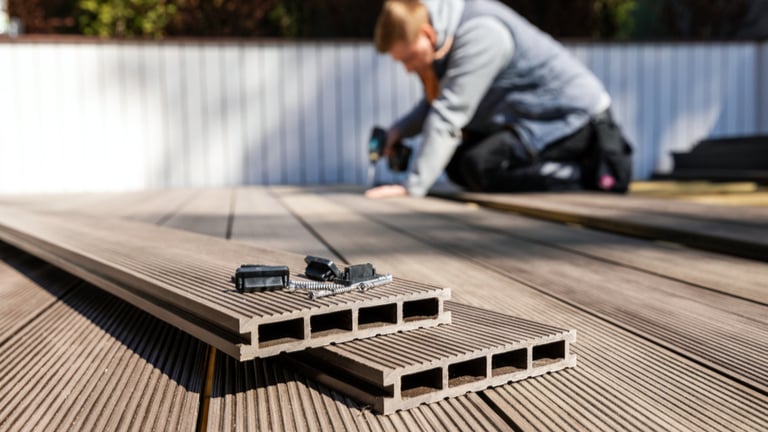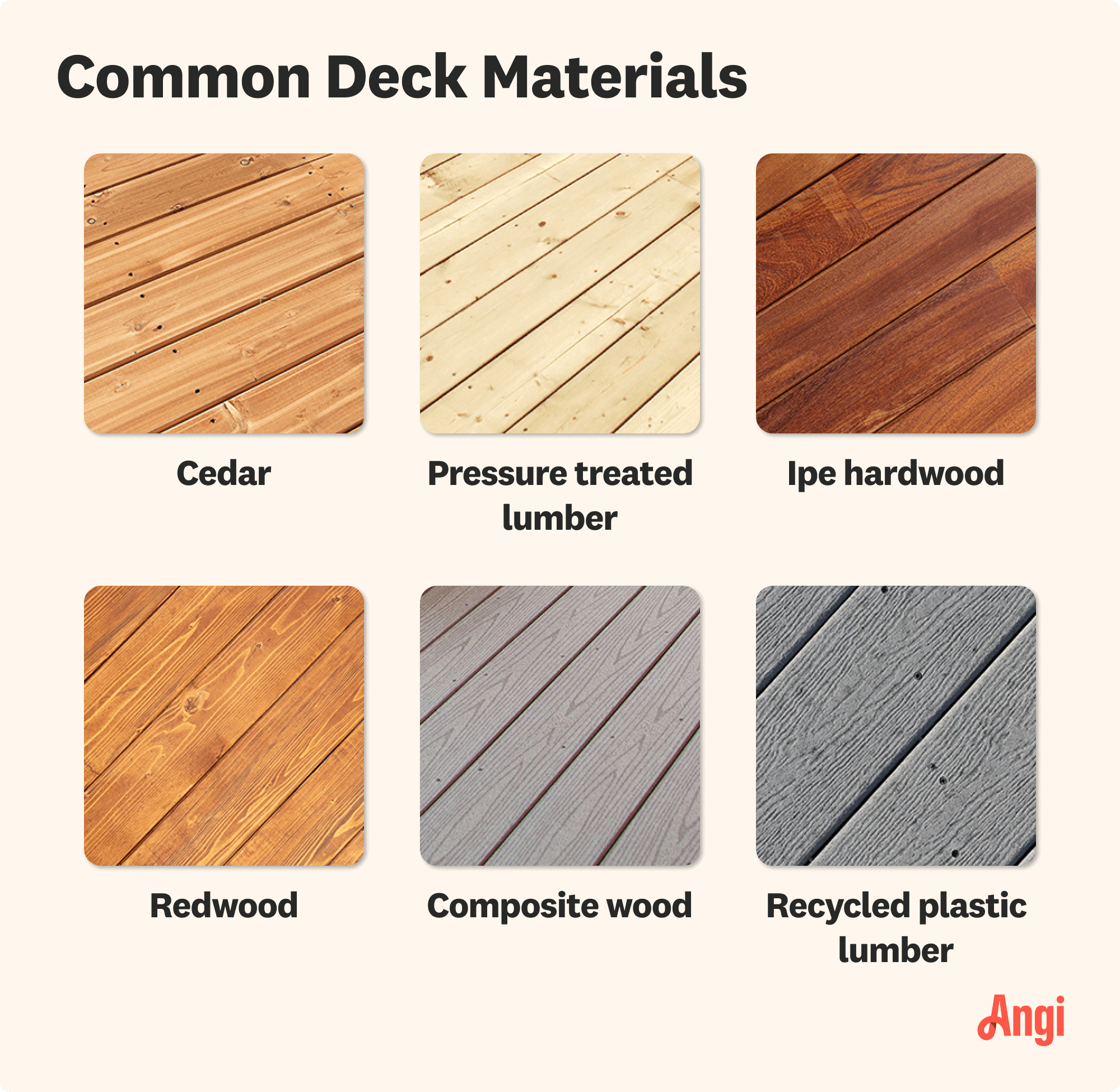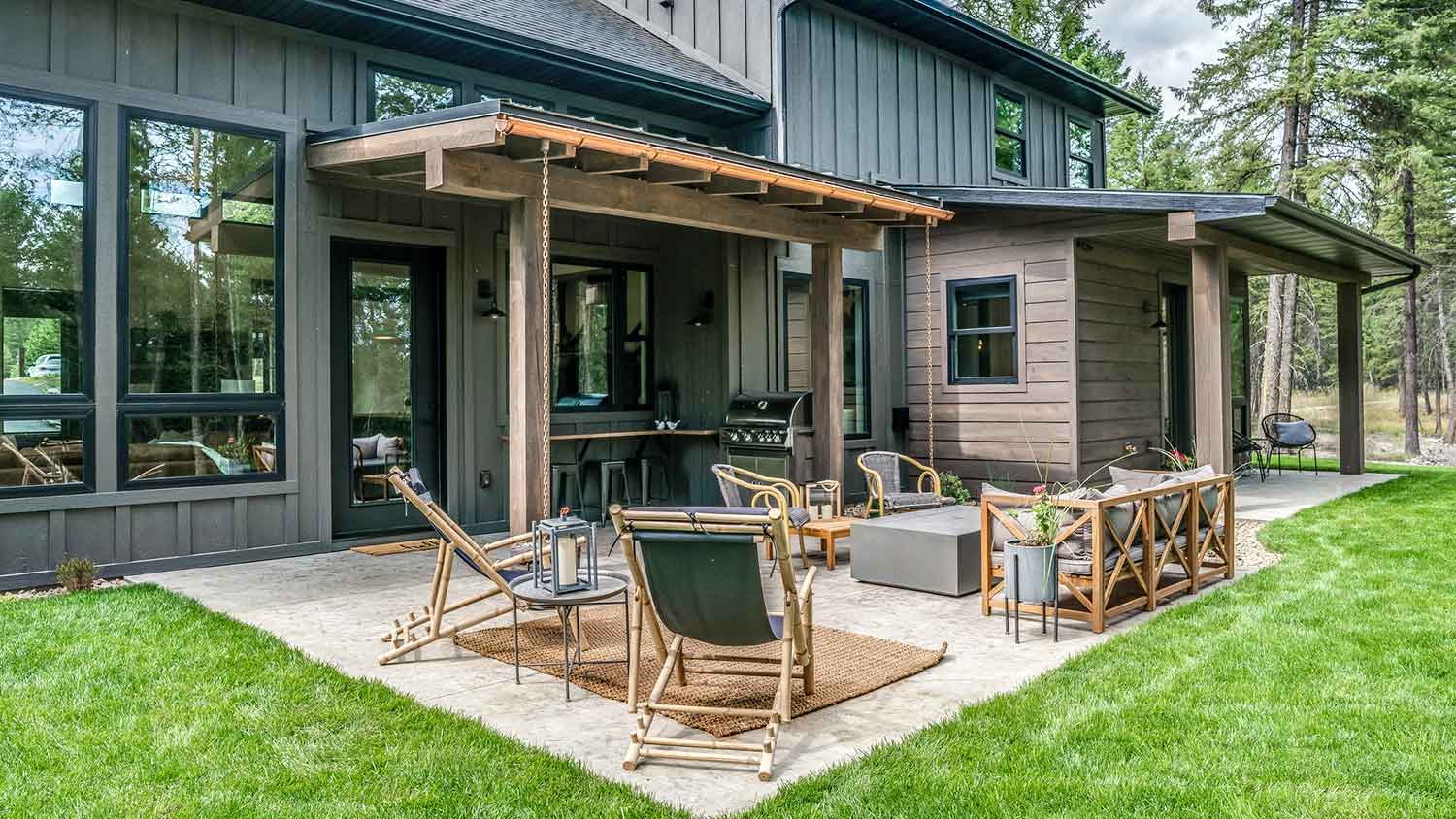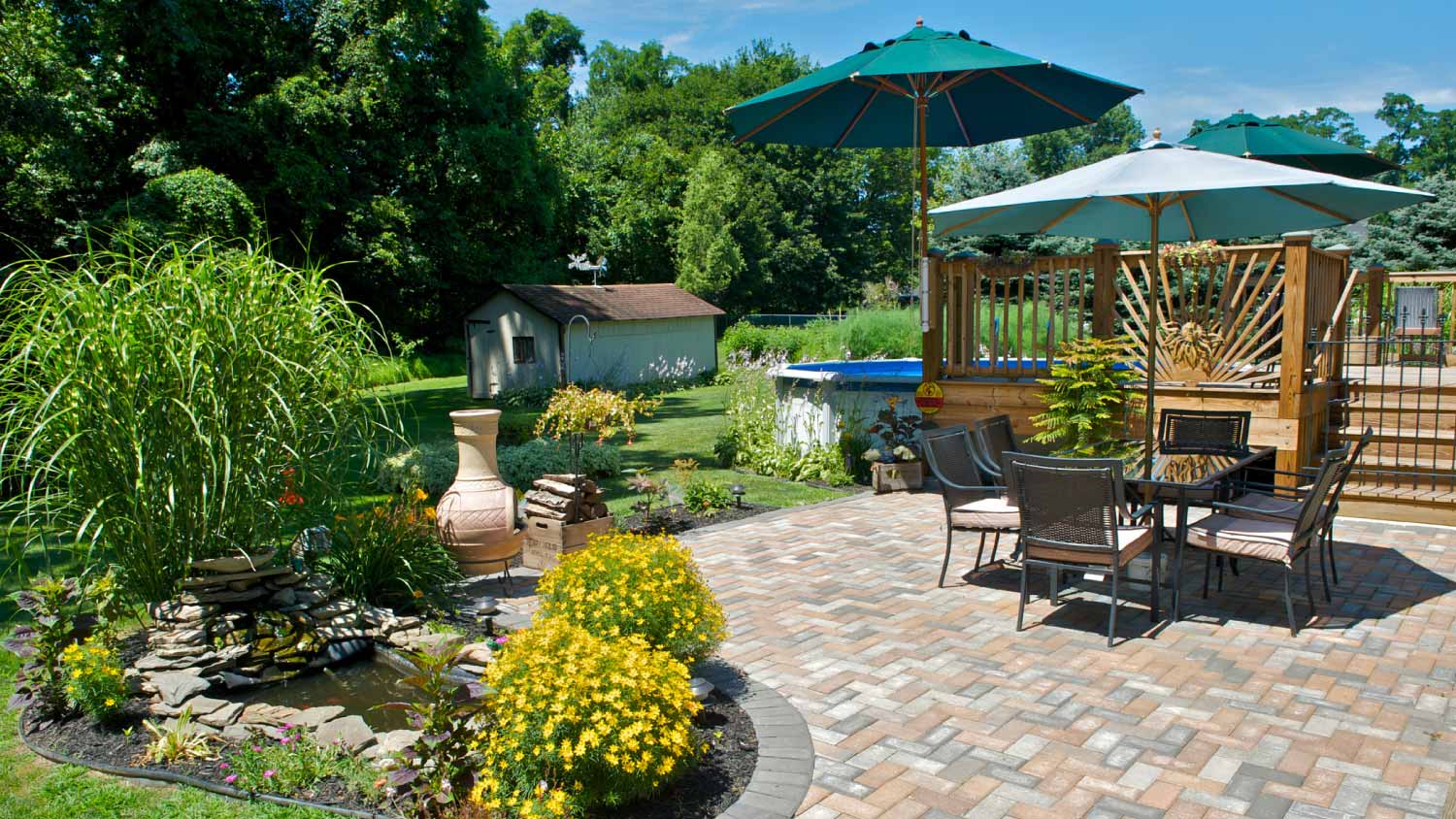
From patios and gazebos to full-on structures, your outdoor space is a blank slate. Learn how much it costs to build and furnish an outdoor room.
Let’s see how these decks measure up across the board


Wood decking provides a more natural aesthetic, and it costs less.
Composite decking is less maintenance-intensive and more durable.
Choose wood decking if you want a more customizable look.
Selecting composite decking means your deck will last longer.
When weighing composite decking versus wood for your yard makeover, the one that takes top spot depends on a host of factors. Your desired design aesthetic, commitment to keeping on top of maintenance, and budget are just some elements that can sway what’s best to select. This breakdown of their pros and cons will help you decide which decking material makes the most sense for your project.
Composite decking is more durable and requires less maintenance. Whereas, wood is often regarded as more aesthetically pleasing, and the initial financial outlay is usually less. However, there isn’t a one-size-fits-all best decking material. By learning more about composite decking versus wood qualities, you can make a decking decision you’ll be happy about years—or even decades—down the line.

Composite decking is made from a combination of materials designed to mimic the look of 100% wood decking. Unlike 100% synthetic PVC decking, composite decking mixes a blend of plastics (or other synthetic fibers) and wood. You might see it being referred to as WPC (wood plastic composite). The materials are bonded, and color tints and preservatives are added to produce a wood-like appearance with added durability.
| Pros | Cons |
|---|---|
| More durable | Artificial appearance |
| Minimal maintenance | Less customizable |
| Slip-resistant | Higher upfront cost |
Best for:
Homeowners planning to enjoy their deck for many decades to come
High-traffic deck areas
Homeowners who don’t have the time or budget to keep up with regular deck maintenance tasks
The plastic elements of composite decking make this material durable and long-lasting. You won’t have to worry about sanding and resealing, and it won’t be susceptible to moisture-loving mold, insects, or UV damage the way wood can be. Composite decking is also often designed with an anti-slip, splinter-free finish for added safety.
Look closely and you can tell that this manufactured material isn't real wood. Wood decking gets its beauty from the imperfections, like its knots, swirls, and unique grain, and the fact that the colors and patterns change as the wood ages. Plus, you can’t stain or paint composite decking to freshen up your decking the way you can with wood.
While composite decking tends to last longer than wood, more economical wood options are available if you’re on a limited upfront budget.

Wood decking is traditionally made from hardwood or softwood lumber that has been cut and processed specifically for that purpose. It’s pressure-treated to provide an additional layer of protection against insects and moisture, which can lead to warping and rotting.
| Pros | Cons |
|---|---|
| Lower cost options | Less durable |
| More sustainable | High maintenance |
| Natural aesthetic | Shorter lifespan |
Best for:
Homeowners on a tight budget
Eco-conscious households
Homeowners looking for a natural finish
Try as it might, composite decking can’t recreate the natural, warm, authentic appearance you achieve with wood. You also get more customizable options if you select wood. You can choose economical softwoods like spruce or pine and luxury hardwoods like ipe or teak. Staining or painting wood decks to match your home, yard fence, or pergola is also possible.
When you’re on a tight budget, softwood deck materials can be the most economical option upfront and minor repairs may cost less since sanding out scratches on wood decking is easy. Plus, you can select sustainably sourced wood boards when you want to be eco-conscious.
You will need to regularly clean, sand, and reseal wooden deck boards to minimize problems with moisture damage and insects. Even with regular maintenance, wood decks don’t last as long as quality composite decks. Over time, they will fade, crack, and split.
Because wood is less durable than composite decking, you’ll likely have to replace them sooner. This can negate the upfront cost savings you made in the long term.
Still not sure whether composite decking or wood is best for your yard? Let’s see how they measure up against each other.
Composite decking has come a long way in recent years, but manufacturers still can’t recreate the true natural grain or attractive aging that comes with wood.
It’s possible to stain or paint wooden decks. You don’t have this option with composite decks, so you might not want to select a classic style that won’t date quickly.
Composite decking, with its added plastics and preservatives, is known for its durability. It’s much more resistant to problems like warping, fungus, rot, and insect infestations than wood.
Dense, high-quality hardwoods, like Ipe or tigerwood, can also be highly durable, but they come with a high price tag.
The most budget-friendly option upfront is softwood decking, which can cost considerably less than composite decking. However, you could spend more on quality hardwood decking than you will on composite decking. Composite decking costs an average of $8,500, and a pressure-treated wood deck costs an average of $8,000.
However, composite decking is often a better long-term investment. If you opt for an economical softwood deck, you might have to replace it a decade or more earlier than a quality composite deck and factor in deck staining costs every few years, which is an average of $850.
While durable composite decks are less prone to damage, they aren’t as easy to repair as wood decks. Where you can often easily sand and refinish any scratched wood deck surfaces, you might have to call a local deck repair company to fix scratches or dents in composite boards. In some cases, it might be easier to replace the damaged boards.
You don’t need to regularly sand down and reseal composite decking like you do wood. Composite decking also doesn’t gather buildup on grime as quickly, meaning it requires less regular deep cleaning and, when it does, a quick deck power wash often does the job. Pressure washing a deck made from wood has to be done with care—and the pressure of power washing can damage some softwood decks.
With the right care, composite decking can last upwards of 30 years; some manufacturers even offer lifetime guarantees. Wood decking typically lasts 10 to 15 years. However, some hardwoods, like Ipe, can last 40 to 70 years.
While there are eco-friendly composite and wood decking options, you have more choices when it comes to sustainable, locally sourced, low-carbon footprint wood selections. Avoid chemically treated wood or composite decking using non-recycled plastic, which isn’t environmentally friendly. Asking your local deck builder to source Forest Stewardship Council- or Programme for the Endorsement of Forest Certification-certified timber provides assurance your wood is coming from a sustainable source.
Wood decks typically offer a slightly higher initial return on investment because of their average lower installation costs. However, the minimal maintenance costs and durability of composite decks can make them a better long-term investment if you don’t plan on moving soon. If you’re revamping your yard for a home sale, be aware that although composite decks last longer, homebuyers are often more attracted to the natural aesthetic of wood decking.
If you invest in slip-resistant, textured composite decking, you won’t have to worry about injuries on wet surfaces the way you might with some mildew-gathering wood decks. There also won’t be the chance of snagging splinters if you’re walking on composite decking barefoot the way you can with poorly maintained wood.
However, some composite decking can absorb heat more than wood decking, so wear foot coverings on scorching summer days.
From average costs to expert advice, get all the answers you need to get your job done.

From patios and gazebos to full-on structures, your outdoor space is a blank slate. Learn how much it costs to build and furnish an outdoor room.

A porch can expand your living space and add curb appeal. Find out what to budget for the cost of a porch on your home with this guide.

A deck skirt can improve the form and function of a deck. Find out what it could cost to install deck skirting in your backyard with this guide.

A poorly draining patio can cause lasting damage. Learn how to fix patio drainage problems the right way, depending on the cause.

Here is everything homeowners need to know about common concrete patio problems, including when to call a pro and what to fix yourself.

Ready to create your perfect outdoor space? Our guide walks you through building a brick patio, from planning to laying the last brick.